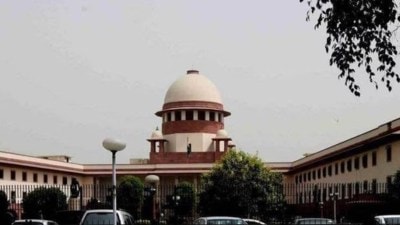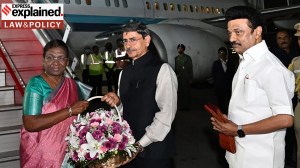The woman who defeated Vajpayee
Subhadra Joshi (nee Dutt) died on October 30, 2003, in Delhi. Few remember she was a tenacious freedom fighter, who went to prison during Br...

Subhadra Joshi (nee Dutt) died on October 30, 2003, in Delhi. Few remember she was a tenacious freedom fighter, who went to prison during British rule and worked with Mahatma Gandhi during Partition. Later, she served as a distinguished Parliamentarian, having defeated Atal Behari Vajpayee, now the prime minister, in a Lok Sabha election.
Always dressed in white khadi, with a dimunitive frame, Subhadra was a Congress worker throughout. She was married to B.D Joshi, who was, however, with the Communist Party.
She once confided in me, ‘‘We kept the vow of brahmachari (celibacy) throughout our lives.’’ Her entire spiritual energy was geared towards serving the nation and fighting communalism.
Subhadra was born in Baroor, Maharashtra, in 1913, but went to school in Lahore. She was expelled for participating in a Congress demonstration and retaliating to a reprimand by the English principal with, ‘‘I don’t want to salute the Union Jack.’’
During her college days she started publishing and distributing underground literature about the freedom struggle, on a manual printing press that a friend and she installed in an abandoned house. An acquaintance tipped off her father that her arrest was imminent, so she fled to Bharatpur in the stealth of the night.
Onwards to Delhi she brought out a newspaper Hamaara Sangram (Our Struggle), along with other underground workers. One of them was B.D Joshi, her future husband.
When the riots started, she was ill and hospitalised at Kingsway Hospital, Delhi. Violating doctors orders she went to a troubled area in a tonga ‘‘because I had worked in the area and should stop them’’. On reaching, Hindu workers directed her to the Muslim areas and Muslim workers to the Hindu areas. But because she had a presence there, she was able to restore calm.
On returning to the hospital ‘‘the doctor decided to throw me out, because I had violated his orders’’. But when Mahatma Gandhi came to visit her in the hospital, the doctor happily relented.
This, however, became a pattern in her life. Where there was a riot, there was Subhadra Joshi, fighting for peace and harmony. She founded the Quami Ekta Manch and relentlessly worked for the cause till the end.
Another anecdote struck me as quite extraordinary. I quote from an oral testimony I recorded at her residence in February 1998, ‘‘When the riots started in Delhi, Gandhiji asked me, ‘How many have been killed?’ I replied, ‘At least 10,000’. He questioned, ‘How many of you (peace workers) have been killed?’ I replied, ‘None’.
‘‘He then said, ‘How can I believe you tried to save them, if none of you has been killed?’ I argued, ‘We try to stop the violence, but the police just does not listen’. Gandhiji retorted, ‘What is this I am hearing! You faced the Britisher’s bullets and now you say you can not manage your own police?’ ’’
I was struck by the quality of the discourse and the palpable sincerity. Can any leader have such a conversation with a worker today?
Subhadra was elected to the Lok Sabha thrice. Her opponent in Balrampur was Atal Behari Vajpayee.
Her account of the election is amusing and, again, I quote from the oral testimony I recorded, ‘‘He said in his election speech, ‘Some Subhadra Joshi has come, nobody knows her, nobody has heard of her, she does not have any relation with the Hindu culture … She neither puts sindoor nor wears bangles. Nobody knows whether she is married or not’.
‘‘Congress workers came to me and asked me to wear bangles and a bindi. I said have I come for an election or a drama? I will remain as I am. I responded in my election speech, ‘What he is saying is right. No one knows a soldier’s religion or caste when he goes to fight for his country … I have come fearlessly, to fight for my country’.’’
Subhadra eventually defeated Vajpayee in the 1962 Lok Sabha election.
A few months ago I got a telephone call from her. She was extremely distraught and asked me to visit her. I rushed to her house in Delhi’s Kaka Nagar. It was, as always, sparsely furnished.
But this time I saw her in a crushed khadi sari, rather forlorn and depressed. Her husband had died a year earlier and her voice quavered. The house was full of memories, with a big picture of Mahatma Gandhi. Then she straightened herself and said, ‘‘India will rise only if we teach our children about the freedom struggle and fight the virus of communalism.’’
I left chastened. It was the last time I met this legendary figure, who has gone, leaving behind a legacy of values.
(The author is a writer and film-maker. Asli Azaadi, her documentary on freedom fighters, featured, among others, Subhadra Joshi)
Photos




- 01
- 02
- 03
- 04
- 05



























